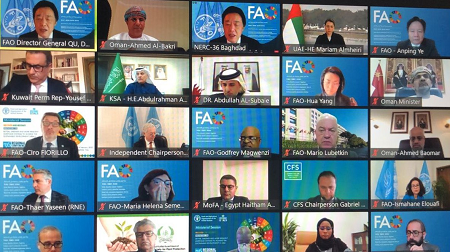Frustrated Hopes at NERC 36

The Regional Office of FAO for Near East and North Africa (NENA), organized the 36th session of the biennial Regional Conference for the Near East (NERC), with the senior officer meeting held on 10–13 January and the ministerial meeting on 7–8 February 2022. Hosted by Iraq in Baghdad, the hybrid sessions this year convened under the theme Restart and Recover: Better, greener and more resilient Agrifood Systems to achieve the sustainable development goals.
According to the partnership protocol signed between the FAO Partnership Office and the International Planning Committee for Food Sovereignty (IPC) as the principal CSO platform, the senior officers at the Regional Office of FAO should work together with the constituent CSOs to prepare the regional conference, by reviewing and providing comments and observation on the conference documents. However, as result of non-communication by FAO’s Cairo-based Civil Society Liaison Officer of FAO, the specialized CSOs’ consultative role in preparing for NERC 36 was omitted, flouting the principles and specific measures of the partnership.
At the senior officers’ preparatory meeting for NERC 36 the regional conference documents were presented without the needed policy debate or consideration of the priority issues or regional initiatives that were adopted at NERCs 34 and 35.
The 36th NERC identified four regional priorities within the 20 Programme Priority Areas (PPAs) of FAO’s Strategic Framework 2022–31:
- Regional Priority 1: Rural transformation and inclusive value chains for youth employment and income: enhancing productivity and income, focusing on youth employment and women empowerment to close the rural/urban divide.
- Regional Priority 2: Food security and healthy diets for all, focusing on trade, enabling policies, food safety and quality, food loss and waste, and advocacy for nutrition.
- Regional Priority 3: Greening agriculture: addressing water scarcity and ensuring environmental sustainability and climate action.
- Regional Priority 4: Building resilience to multiple shocks and stresses.
During the period 2022–23, the Regional Office will accelerate agricultural transformation and sustainable rural development in support of the SDGs, through continuing to maximize the impact of the Hand-in-Hand Initiative. Also the COVID-19 Response and Recovery Programme aims to mitigate the immediate impacts, and support the longer-term resilience of livelihoods, moving toward a green recovery, transforming agrifood systems, and calling for immediate-, medium- and longer-term actions to prevent the health crisis from becoming a food crisis.
The four documents of the regional priorities should have been reviewed by the relevant CSOs that seek to accompany FAO toward food sovereignty and support small-scale food producers. FAO’s Regional Office has been the coordination point to engage such partners in implementing the agency’s policy agenda toward full realization of the right to food for all, and ensure that small-scale family farming is included in, and benefits from equitable development policies.
The precipitous decline in FAO’s partnership with civil society in NENA has coincided with the tenure of FAO’s new Director-General Qu Dongyu (China), who took office on 1 August 2019, and the preparations for the UN Secretariat-initiated Food Systems Summit (UNFSS) of September 2021, both of which have favored corporate capture of the policy and partnership arena.
In addition to this arrested development, amid increasing drought, famine, locust infestations, armed conflict and displacement, as well as the global pandemic, IPC has focused its collective efforts rather on planning a global alternative gathering in 2023. This “Nyéléni III process” aims to revitalize the policy debate parallel to FAO and the Rome-based agencies, rather than within them.
Joseph Schechla, facilitator of the IPC NENA member group, explained that “the region’s CSO members of IPC have continued to stress the original priorities of civil society’s engagement with FAO policy and program. However, the cultural and behavioral shift within FAO since 2020 has led to a kind of estrangement across regions.” Nonetheless, he reported that the IPC in NENA has recently been reaching out to the FAO Regional Office and Partnership Office in Rome to restore the partnership at a time when IPC is redefining its engagement with the agency through a new memorandum of understanding in 2022.
Image: Screenshot from a hybrid session of NERC35. Twitter.
|